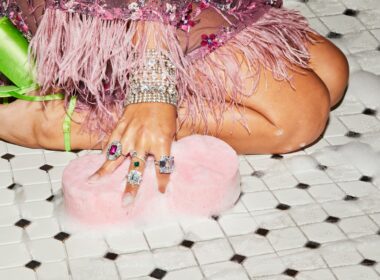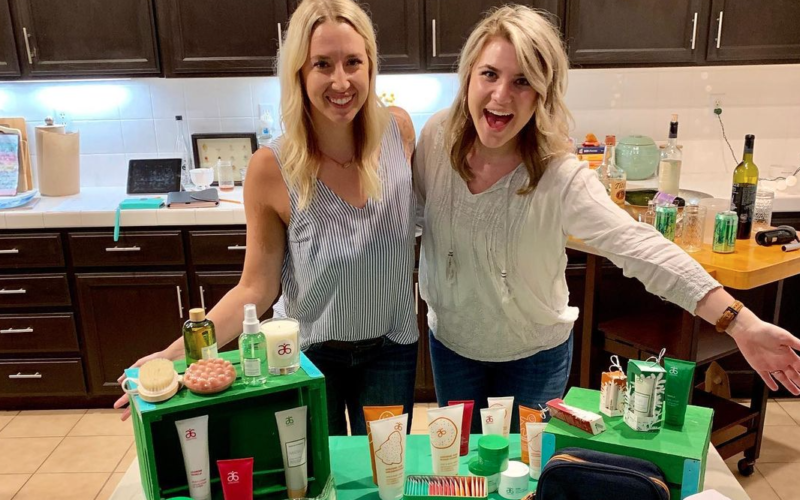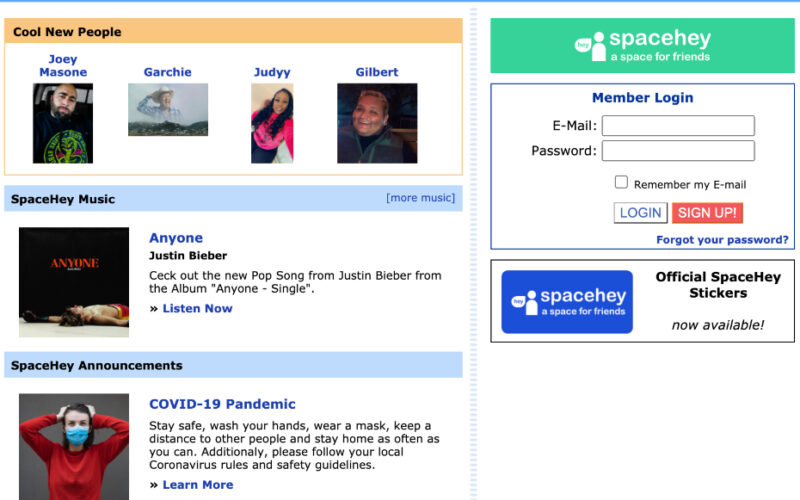MLMs are much of a foreign concept here in L.A., but chances are you’ve encountered a “Boss Babe” (as their team members call themselves) on Facebook at some point, likely in the form of a former classmate or religious peer—claiming to own a “small business.” The worst MLMs are many of the ones you’re most familiar with (namely in the beauty industry). But you probably don’t realize they actually operate through a pyramid scheme business model that scams anyone who isn’t at the very top.
Before we get into the depths of multi-level marketing, let’s talk first about what drew me to this phony albeit fascinating facet of work. Growing up, I think we can all say we’ve been subjected at one time or anther to a Tupperware, makeup or sex toy party. The host boasts a night of wine and champagne, mingling, hors d’oeuvres and even free gifts! Sure, you feel slightly obligated to buy something, but it’s usually something you can use, so why not? Never did I realize the darkness and destruction associated with these seemingly harmless gatherings.
Years following one of those parties, I was actually approached by none other than Ian Ziering, who attempted to recruit me to Team 90210, his own group that falls under the much larger umbrella of Nu Skin, a luxury MLM that sells skincare and devices. His team is chockfull of—you guessed it—naïve Beverly Hills, 90210 devotees swayed to join out of pure fandom. He pegged me as potentially one of them.
I met Ian briefly at an event in 2017. He was there with his then-wife and none other than Tori Spelling and her entire brood. Being the self-proclaimed biggest 90210 fan who ever lived, it was exciting seeing the two former stars not only still pals, but also just casually chatting it up with attendees at this low-key Sunday event on the rooftop of a Miracle Mile apartment complex. No one (including the girl who invited me) had any real clue what this event set out to do. There were signs that seemingly promoted “Tori’s Beauty Box,” but there were no such boxes or details in sight. Oh well, there was wine and some snacking, so what did I care?
I snapped my obligatory shot sandwiched between Tori and Ian (see embarrassing grin below), told them I was a fan and didn’t think much else of it. Ian suggested I give his wife my info so we could connect about me reviewing “Tori’s Beauty Box” for the website I wrote for at the time. We exchanged emails and I went on my merry way.
The next day, I shot Ian’s wife a note—and to my surprise, she replied immediately: “What’s your phone number? Ian wants to give you a call about something. He’ll explain.” I didn’t realize we needed a full-blown phone call to discuss the contents of “Tori’s Beauty Box,” but alas I obliged. Who was I to turn down Steve Sanders, amirite?
What followed was an hour-long sales pitch—all while I was in the middle of my work day. Ian tried to convince me how easy it would be to sell an everyday necessity like toothpaste, and how I could join his exclusive Team 90210, and have access to him directly at all times. I could recruit my friends and “make money!” I was shook. So… guess there’s no “Tori’s Beauty Box” after all! When I finally got off the call and said “I’d consider it” (syke), I walked out of the conference room at my office, looking like I’d just seen a ghost. My coworkers were shocked by everything that transpired.
With the exception of telling my closest friends about my bizarre experience, I largely put the encounter out of my mind. Needless to say, I never joined Ian’s coveted Team 90210 clique, but I’m sure it’s a swingin’ time. It wasn’t until two years later, after watching Vice‘s detailed documentary on LuLaRoe leggings, that I really got invested in MLM culture. It’s an extremely fascinating world, and this doc is a must-watch.
Fast-forward to fall 2020, and I stumbled upon the TikTok account of college student, Heather Rainbow (yes, that’s her real last name). As the unofficial face of Anti-MLM TikTok, Heather breaks down every MLM’s business model, debunks all of their so-called perks and takes a stand against anyone who tries to counter her well-researched facts. Raised in an evangelical household, Heather regularly explains to her 100k followers why religion and MLMs go hand-in-hand.
@heather.elise.rainbow Comment the other bossbabe phrases that you see on social media! ##antimlm ##pyramidscheme
♬ original sound – heather elise
Since liberating herself from her mother’s conservative practices, Heather has gone on to educate people so they don’t fall into the same traps as many of her peers growing up. Heather’s wealth of research and knowledge is so astounding that she even caught The Atlantic and Newsweek‘s attention. She was quoted in both, once TikTok announced a policy in December banning content that “depicts or promotes Ponzi, multi-level marketing, or pyramid schemes.”
I reached out to Heather, curious to learn more about how she got this deep into studying MLMs. She dished to skyelyfe on literally everything you need to know about this toxic culture, how to avoid being a victim and the worst MLMs out there. Keep reading for what she has to say!
skyelyfe: For those who don’t know, what’s an MLM, why are they so commonly joined, and what’s the issue with them?
Heather Rainbow: An MLM, or a multi-level marketing company, is a company which uses a business model involving three key things: A product to sell, an incentive to recruit, and a multi-tiered compensation plan. Every single MLM out there has these basic features. They are so commonly joined because of No. 2: an incentive to recruit.
Every MLM compensation plan factors in some kind of incentive, usually monetary, to add new people into the company. This is often framed as an “opportunity” on social media posts trying to rope people in. Of course, this leads to the question, what’s wrong with that? Well, of course selling for commission is totally fine, but the recruitment aspect is what makes these companies so comparable to pyramid schemes.
A pyramid scheme is a model in which no product is sold (but as shown in legal proceedings with MLMs, the line is more blurred than just the presence of a physical product). Recruitment would be the sole money-making opportunity in this scenario. Unfortunately, MLMs are extremely comparable to this model, making them, in my opinion, unethical.
It is essentially impossible to make a living wage in an MLM without recruiting and adding new people into the company, so the selling aspect is much less important than the recruitment aspect. If an individual makes more money by recruiting than by selling, there is a significant issue in the business model.
SL: Known as a “scam” by many outsiders, what keeps people invested in these so-called “businesses”—especially if they’re not making money?
HR: A couple key things go into this. First of all, the life portrayed on social media by MLM participants. Monat, Itworks, Arbonne, all these distributors and many more are known for displaying a lavish lifestyle in their posts to make the “opportunity” seem legit. Ultimately people believe what they want to be true, so an old friend sliding in your DMs because they want to help you make money when you’re in a tight spot can seem like an amazing opportunity, when in reality they have ulterior motives.
Another key factor in keeping people invested in MLMs is the sunk cost fallacy. Once you’ve sunk money into something, it’s only human to do absolutely anything to get that money back, especially if you have an upline telling you it’s possible if you only try hard enough. This fallacy essentially creates a bias toward the opportunity, telling you that you have to continue this MLM since you already threw money in.
SL: Tell us about your educational and professional background. And how did you transition into becoming the face of anti-MLM culture on TikTok?
HR: I’m a junior in college right now, and I’m a pre-med student studying chemistry and math. This of course is totally unrelated to the legal and ethical aspects of MLMs, which are kind of a separate interest of mine that I started researching around the beginning of the pandemic. I’d always sensed something off about these companies, and growing up in a small town in a religious circle, they were extremely prevalent and normalized.
After seeing the companies spike in popularity and use the pandemic to their advantage via social media, I fell into a massive research rabbit hole where I uncovered the truth about this business model and the real ways it’s hurt people. I started making TikToks, and I was shocked by the positive feedback I got and how interested people were in knowing more. And the rest is history!
SL: Do you feel like you’ve helped anyone through your platform? Or do you feel like none of the people deep in MLM culture are able to see your point of view?
HR: I’m so honored every time I receive a comment or a DM saying I helped someone get out of their MLM. I’ve had people in various MLMs—Monat, Arbonne, Younique, tell me they started rethinking their practices after seeing my videos break down the compensation plans and legal problems. It really is my greatest accomplishment to know I helped someone out there. Of course, there are people who’ll never understand what I’m trying to do, and will always see me as a negative hater, but such is life. I wish them the best, although sometimes it’s hard not to get sassy with them. I try to see them as a victim of the company they’re participating in.
SL: Moving on from the business aspect, let’s get into the majority of products sold by MLM distributors—or what do they call themselves? Are these products ever high-quality? Or are they actually a scam, too?
HR: Distributors, consultants, market partners—these are all words they use to describe themselves, although I, of course, think salespeople is the most accurate. Quality of product often comes down to a matter of opinion. Some products I feel very strongly negatively about, like the Kangen water filter that costs thousands of dollars, as well as ketones from Pruvit, and shakes from Beachbody.
Personally, with my knowledge of science and the human body, I think all these things are a massive waste of money. But of course, some people swear by them. I do think some sellers are genuine with their love for the product, and I wouldn’t want to call them all liars. But I do think they’re extremely biased and the placebo effect is extremely real. I know some people that genuinely enjoy Senegence lipstick or Monat hairspray, and I don’t fault them for that, although I wish they would support a more ethical business model with their purchases.
SL: What are some of the most commonly known MLMs that people in L.A., for example, probably don’t realize are such?
HR: Being from a small town, I see a lot of smaller MLMs that maybe aren’t as pervasive in larger cities. These could include Zyia, Senegence, Paparazzi, Vantel pearls, et cetera. And even larger MLMs like Mary Kay, Pampered Chef and LulaRoe are way more prevalent here, from what I have observed. Everyone knowns someone in an MLM.
SL: Going off of that, why are MLMs far less common in metropolitan cities like L.A.? Generally, who is your typical MLM salesperson, and why?
HR: There are many answers to this question, and it’s really an interesting one to think about. MLMs are often joined by stay-at-home moms wanting to make an extra income while spending time with their kids. This type of family, with a father working and a mom staying at home with the kids, is extremely common where I grew up. The conservative, “traditional” family is so often the target of these companies, because the “mom guilt” card is incredibly effective. Don’t you want more time with your kids? Don’t you want to provide for your family? These are all sentiments expressed by MLM recruiters. These families definitely exist in cities too, but being from a small town, I know just how important that structure can be to many people here.
Unfortunately, MLM money is thrown at the republican party as well, and the link between republicans, conservative evangelicals and MLMs is undeniable. As I like to say, spreading the gospel is remarkably like spreading the “good news” of an MLM. All these factors contribute to MLMs spreading like wildfire in small-town churches and families.
SL: When celebrities (like Ian Ziering, for example) join MLMs, how does his “business” experience differ from that of a regular person?
HR: Ah, celebrities in MLMs. These figures are often touted as success stories by MLMers, and they add credibility to the company’s name. For example, Blac Chyna joined Monat this year, and the distributors screamed it from the rooftops. Jenna Boyd from Atypical is near the top of Rodan + Fields. One of the major contributing factors to being successful in an MLM is a social media following, or better yet, a fan base. This makes it incredibly easy to skyrocket up the ranks, generating huge profit. People will do anything to talk to their favorite celebrity, or even any celebrity, and that includes joining a multi-level marketing company.
These opportunities can be hugely profitable for anyone with a built-in following, as recruiting will be laughably easy. This is unfair and unethical to say the least. People do enjoy Nu Skin products, although personally I see them as incredibly overpriced, and I find it hard to believe these products are the source of Ian Ziering’s good skin.
SL: Are any MLMs better or worse than others? Or are they all pretty much the same?
HR: Even those within the Anti-MLM community have varying opinions on this. Some MLMs like Tupperware or Pampered Chef have extremely loyal customers who genuinely love the product, and these are seen as less predatory than other such companies. Unfortunately, I still see these companies as unethical due to the recruiting nature of the business model, although I’m not judging anyone for purchasing. Because the three key things that make up an MLM, as I mentioned earlier, include an inherently unethical recruiting model, I do not support or buy from any of them.
SL: Is there anything else you want to share on this matter? And what else can you tell us about your life outside of TikTok?
HR: Thank you so much for asking me to share! I’m always happy to talk about the ethics around MLMs and how we as consumers should be aware of what’s going on in the background. My goal is to educate those who vaguely know what MLMs are and maybe sense that something is off, but aren’t armed with the specific information to understand why. Remember that when someone is asking you to join, they are likely going to make money directly from your buy-in purchase.
On my platform, I also like to discuss my experience leaving evangelical Christianity and being homeschooled almost my entire life. I’m thrilled to have grown a social media following from talking about issues that are important to me. Aside from TikTok, I love being a woman in STEM, I love powerlifting and I love being a barista!
Now that we’ve got scammy skincare out of the way, let’s get into the good stuff with a review of Nudestix’s Nudeskin skincare line, HERE!












